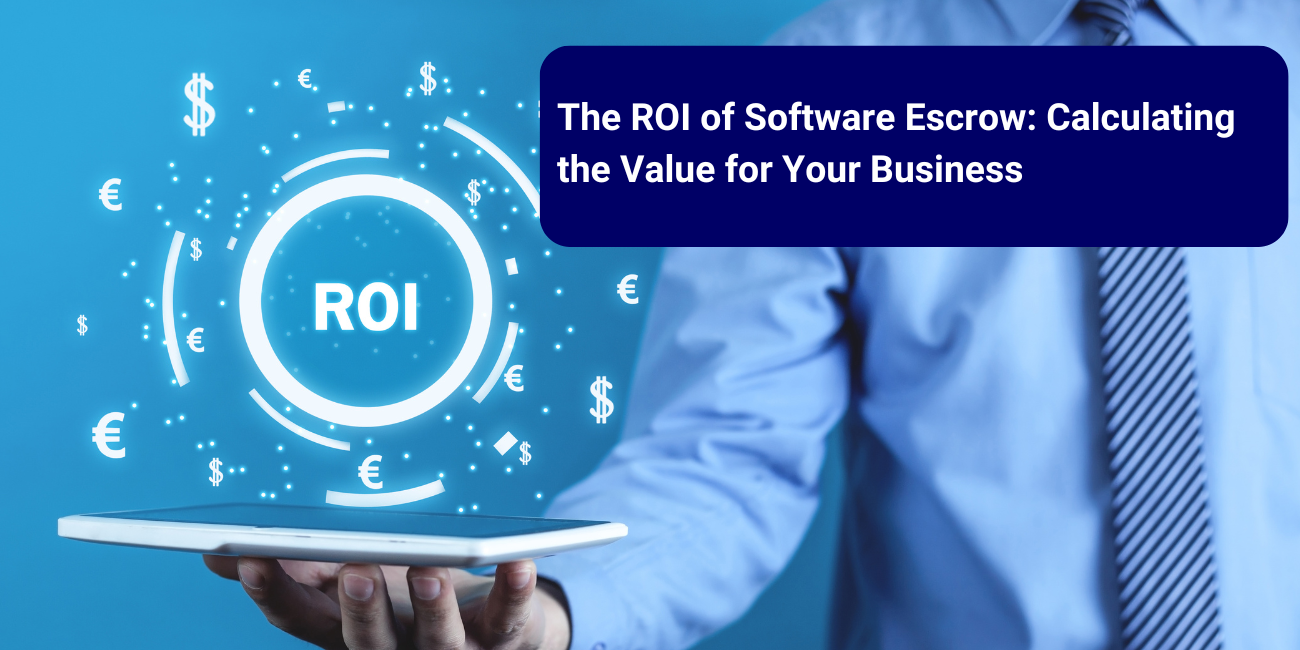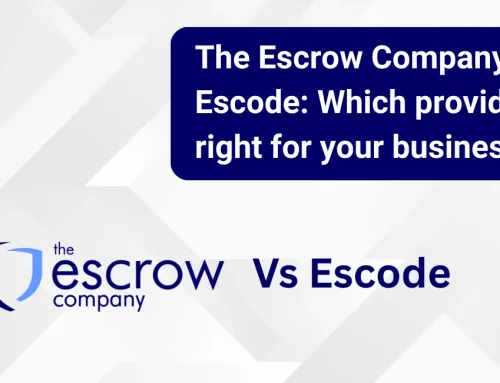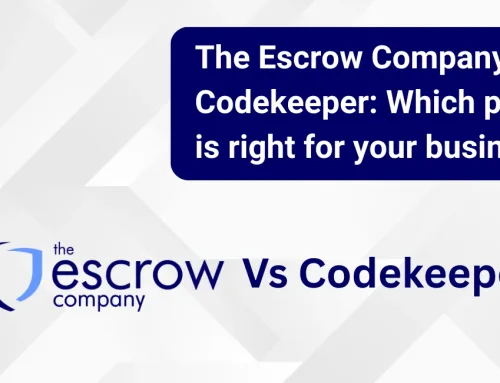The ROI of Software Escrow: Calculating the Value for Your Business
In today’s fast-evolving tech landscape, start-ups are innovating fast, but many are also shutting their doors just as customers grow more dependent on their solutions. Against this backdrop, there are multiple ways in which software escrow delivers powerful ROI, for both vendors (depositors) and end users (beneficiaries). Here’s how.
For Software and SaaS Vendors: Building Trust, Meeting Client’s Needs, and Closing More Deals
Accelerated Sales and Competitive Differentiation
When assessing software vendors, especially start-ups and scale-up SaaS providers or in regulated markets, buyers often expect a reliable software escrow as a condition for signing. Offering software or SaaS escrow to mitigate failure risks sets you apart and can significantly shorten sales cycles and new supplier due diligence reviews. Enterprises and regulated clients see software escrow as a simple method to build trust into the project, reduce negotiation friction with new working relationships and speeding up deals to signature.
By increasing their appeal to enterprise clients, who would otherwise have overlooked them as a risky investment, vendors can secure more lucrative contracts, which increases their ability to then secure more deals with the same resources.
Secure Backup Against Emerging Risks
Some vendors also use software escrow as a secure backup of their own code. In the event of a ransomware attack, for example, software escrow ensures a clean, retrievable copy is held off-site. While compliance frameworks such as ISO simply require “appropriate backups,” many organisations choose software escrow because it provides a trusted, third-party layer of security that reduces operational risk, whilst also ensuring their compliance.
Transparent, Predictable Costs
With clear, fair pricing and global infrastructure, software escrow is a cost-effective way to strengthen client confidence. Instead of lengthy contract negotiations about “what if” scenarios, stringent SLA or financial runway reviews, vendors can point to their software escrow arrangement as a ready-made assurance mechanism.
The ROI of software escrow to a vendor can be as simple as the value of a contract that would otherwise not have closed with a client who requires certain business continuity risks addressed.
For Beneficiaries: Ensuring Business Continuity, Minimizing Risk, and Safeguarding Investment
Access to Critical Software
If a supplier fails due to insolvency, breaches contract, or is acquired by a competitor of the client, software escrow and SaaS escrow services provide access to application code, client data, cloud environments either production or backup systems and necessary technical assets to continue operating the service. Ultimately, it’s a plan that reduces interruption in operations for mission-critical applications.
Assurance Through Verification
Software & SaaS escrow is about more than simply holding code, it’s about providing confidence that continuity measures will work when they’re needed most. Providers like The Escrow Company offer periodic, independent verification, including tests on a wide range of cloud environments including applications hosted on AWS, Azure, and Google Cloud, to confirm the deposited software assets are complete and useable. As with any disaster recovery solution, testing and reliability is a cornerstone of business continuity, ensuring that what’s in the software or SaaS escrow is not just stored, but usable is an essential part of the process.
The Escrow Company’s SaaS Access Continuity service ensures verified admin credentials to the vendor’s production environment are escrowed and if released, allows the beneficiary to continue operating the existing production system if the supplier fails. For businesses that want even greater assurances, our advanced services such as SaaS Recovery Escrow and Managed SaaS Continuity go further; providing a secondary cloud environment that can be spun up, tested, and either handed over to your team or managed by us – buying the beneficiary crucial time when an important vendor has had significant issues. This level of support delivers true peace of mind, knowing that there is a partner on hand with the knowledge and skills to assist with the recovery of your critical third-party software applications.
Safeguarding IP When Using Third-Party Developers
Another scenario we see occurs when companies outsource development but retain ownership of the IP. Going into a new relationship, often early on into a business’s life can be daunting and a risk. By utilising software escrow during development, beneficiaries gain peace of mind that they’ll be able to access their IP if the relationship with the third-party developer ever changes, as well as validate and document certain releases as appropriate. Software escrow acts as a safeguard, ensuring they won’t be locked out of their own product and can provide a third-party party review of elements such as code quality or security vulnerabilities.
Alignment with Risk and Compliance Strategies
For industries such as finance, insurance, or critical infrastructure, software escrow is often required to align with internal governance or industry regulations. It reinforces due diligence during procurement, vendor onboarding, and even M&A activity.
Avoiding Vendor Lock-In
Having materials securely held in a software escrow gives organisations the freedom to continue with another partner if support falters. It’s a powerful reassurance against lost upgrades, failed support agreements, or disputes, keeping the software ecosystem resilient.
Real-World Value: Quantifying the ROI
The return on investment in software escrow is clear when you compare the modest cost of implementation to the potential financial, operational, and reputational losses that can arise from supplier failure or service disruption.
For beneficiaries, the numbers speak for themselves. If access to a mission-critical system is lost, downtime can easily run into millions of £/$ per day in lost revenue, penalties for missed SLAs, reputational damage, and client churn. In regulated industries such as finance or healthcare, the fines for non-compliance alone can exceed the annual cost of software escrow many times over.
For vendors, the ROI is often found on the sales side. Enterprise-level clients can be worth 6–7 figures annually, yet they may refuse to sign without a software escrow in place to satisfy compliance, procurement, or risk management requirements. In that scenario, the cost of not having software escrow isn’t just the low monthly software escrow fee – it’s the opportunity cost and value of the deal you didn’t close and lost to a competitor who could meet the client’s needs. Some vendors even sell software escrow as a bolt on additional service to their standard offering
In both cases, the economics are simple: a relatively small investment in software escrow safeguards against outsized, unpredictable losses, and can even unlock new revenue streams.
The Escrow Company Advantage
- Global reach and reliability: Offices in London, Atlanta, and Sydney, serving clients across the globe.
- Modern, automated workflow: Supporting deposits via Git (GitHub, GitLab, Bitbucket, Azure DevOps), encrypted and seamlessly.
- Comprehensive SaaS and cloud compatibility: SaaS Escrow options extend across AWS, Azure, and Google Cloud environments.
- Security and transparency at scale: Our company, Escrow London Limited trading as The Escrow Company is ISO 27001 certified and we offer transparent pricing, trusted by businesses worldwide.
Bottom Line
Whether you’re selling SaaS products, developing mission-critical custom software, or integrating third-party platforms into your operations, software escrow isn’t just insurance, it’s a strategic investment in a successful software project.
Frequently Asked Questions
The ROI of Software Escrow comes from protecting against the high costs of downtime and loss of access to critical systems. For beneficiaries, even a single day of disruption can mean millions in lost revenue, fines, and reputational damage - far outweighing the modest annual software escrow fee. For vendors, software escrow can be the difference between winning or losing enterprise contracts worth six or seven figures annually, making it a small investment with outsized returns.
For vendors, Software Escrow reduces sales friction by addressing enterprise buyer concerns around business continuity. It builds trust, speeds up deal cycles, and acts as an extra safeguard against risks like system failure, all while keeping costs predictable.
Verification ensures that Software Escrow materials, such as source code, scripts, or cloud environments, are complete and deployable. This gives beneficiaries confidence that the deposit is usable in a real release event, not just a storage arrangement.
Yes. If you outsource development but retain IP ownership, Software Escrow ensures you always have access to the code. This prevents vendor lock-in from blocking you from using your own product in the future.
Traditional Software Escrow protects on-premise or installable applications by securing source code and supporting documentation. SaaS Escrow can go further also covering cloud environments, deployment scripts, and databases, often with full recovery or managed continuity services options attached.








